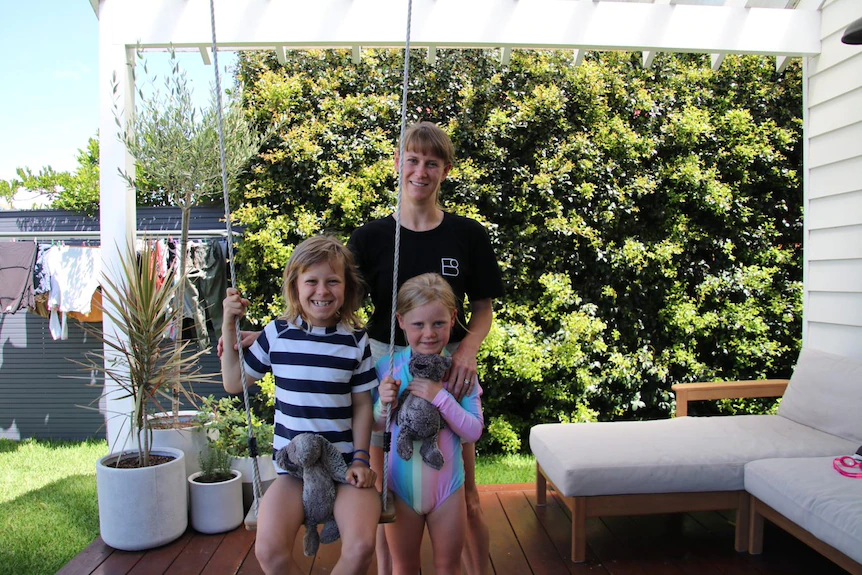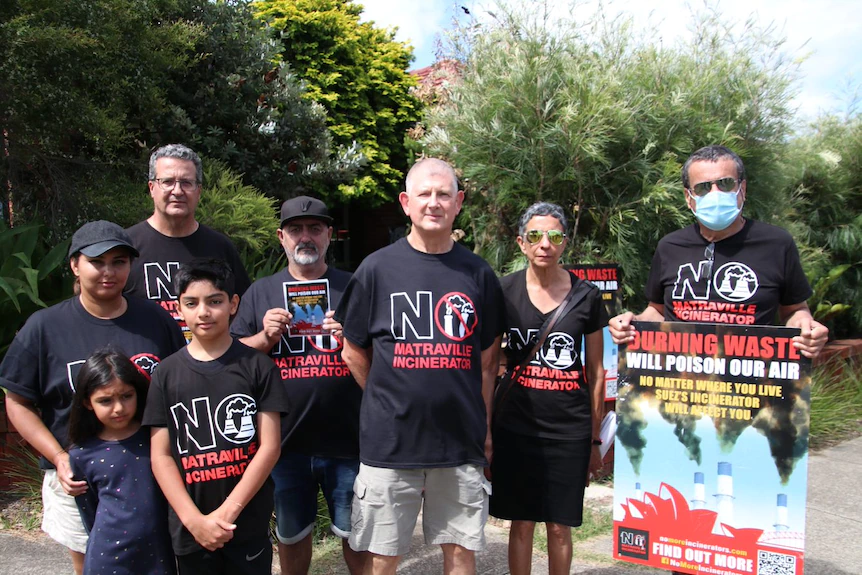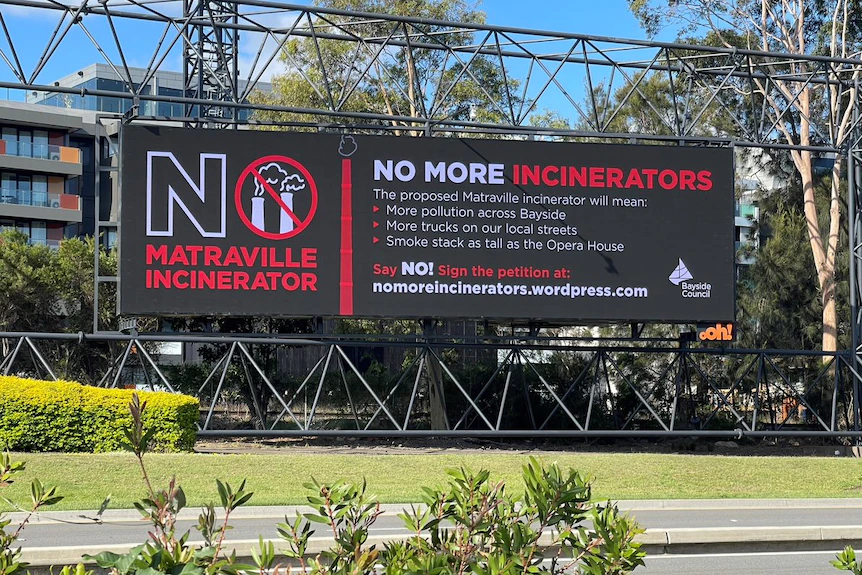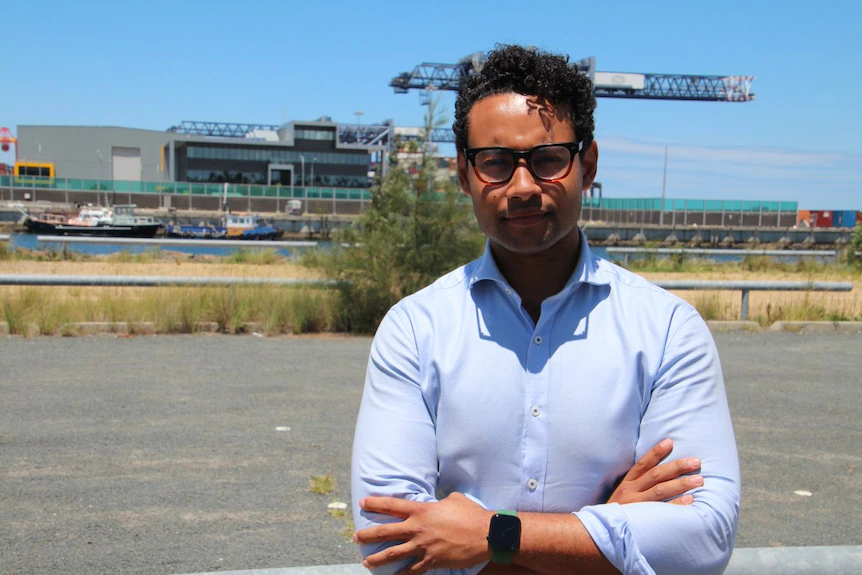The O’Briens worry they’ll have to skim ash from the surface of their pool most mornings when they go for a swim.
They spent five years searching for the perfect home to raise their two daughters before settling on a house in the eastern Sydney suburb of Matraville.
But a month later, they learned a 60-metre-tall chimney could be built just a block away and interrupt their blue skyline.
It would sit on a plant that harvests energy from the burning of processed waste, pumping the leftover emissions into the air nearby.

“We’ll need to consider our options and move away [if it’s approved],” Victoria O’Brien said.
“To be in the immediate proximity of that level of pollution is a game changer.
“We’re bracing for a financial hit if it goes up.”
The $250 million plant would generate power and supply it to the Opal Paper Mill, and even though it would be based on Opal’s site, waste management company Suez would build and run it.
An estimated 165,000 tonnes of non-putrescible waste — construction material and other non-organic waste — would be burned at the cogeneration facility 24 hours a day, seven days a week.

Doing so would eliminate the Opal Paper Mill’s reliance on gas and electricity, the company said, freeing up enough power to run 82,000 homes a year.
But offsetting the claimed savings would be 21 trucks delivering the processed waste from Chullora in Western Sydney to the site in eastern Sydney.
Any leftover power will be piped back into the electricity grid, according to planning documents.
Matraville, 9 kilometres south-east of Sydney’s CBD, is no stranger to industrial and commercial precincts.
It’s flanked by Port Botany, the shipping yard that connects NSW to much of the world’s trade.

Other factories and plants punctuate parts of its skyline too.
But the proposed energy from the waste plant has sparked fierce opposition.
Community group No More Incinerators has handed out 30,000 leaflets, held monthly information sessions and launched a petition that has the signatures of more than 19,000 people.
Chris Hanson, the group’s campaign manager and a retired chemical engineer, said he was worried about the effect the plant would have on the health of residents.
“We’re going to have increased truck movements, we’re going to have increased noise levels, we’re going to have residents in permanent shadows,” he said.
“But the main reason we oppose this is it’s going to have a long-term chronic effect on our health, and there’s a viable alternative.”
Experts who spoke to the ABC said the plant’s proximity to residential homes — the closest are just 130 metres away — raises serious health concerns.
“It is a dangerous thing to put waste from energy plants that are burning plastics into urban environments,” Peter Newman, a professor of sustainability at Curtin University in Perth, said.

“Throughout the world, you find places where communities are suffering and the work done to find out the health impacts is usually 20 years too late because it takes a long time for this to build up and cause the cancers that grow.”
Suez said the residual plastic on the processed waste “would comprise less than 10 per cent of the 165,000 tonnes” processed each year.
“The Botany Cogeneration Plant would utilise state-of-the-art technology and adhere to the highest international standards for air quality,” a Suez spokesman said.
“An independent human health risk assessment… will consider risks presented to humans from any exposure (inhalation, ingestion, skin contact) to pollutants relevant to the project.”
The waste management company said it would continue to consult with the community as the proposal progressed.
Residents opposing the development have the support of two local councils.
Randwick Mayor Dylan Parker said residents had already been through enough.
“These people have already put up with a legacy of contamination from heavy industry, they’re already putting up with heavy vehicle movements, they’re already putting up with living next to the port … as well as living right on the doorstep of the airport,” Mr Parker said.
“They’ve taken more than their fair share, but this proposal is too far.”

Bayside Council’s opposition is overt.
The council’s garbage trucks are covered with “No Matraville Incinerator” decals, and large digital billboards play the same advertisement outside of Sydney International Airport.
The NSW government, the authority that will decide if the project goes ahead once the application is complete, stated its support for energy from waste plants in a road map released late last year, when they “can deliver positive outcomes for the community while protecting human health and the environment”.
The facilities could free up capacity at landfills as at current rates, the state government estimates landfills holding the kind of waste the Suez cogeneration plant would burn “will reach capacity by 2030”.
But the government says they should be located “away from high-density residential areas”, near Bathurst, Lithgow, Casino and Queanbeyan, where complementary waste facilities already operate.
The government’s criteria states exceptions can be made if the facility is replacing “less environmentally sound fuels including coal or petroleum-based fuels,” but it’s unclear if Opal’s current gas facility could be replaced with energy from waste under the current policy.

